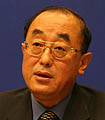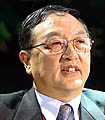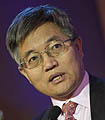|
Health Chief Now Top Auditor

Gao Qiang, Vice Minister of Health, confirmed on February 6 that he would be standing down from his current job. Beijing-based Caijing Magazine quoted another Vice Minister of Health, Ma Xiaowei, as saying that Gao would take up a leading post at the Committee of Financial and Economic Affairs of the National People's Congress (NPC), China's top legislature. He is also reportedly to head a committee under the Standing Committee of the NPC, which is responsible for auditing the state budget.
Gao, 65, an experienced financial expert and former vice secretary general of the State Council, was moved to the position of executive vice minister of health in April 2003 when China was launching an all-out fight against the SARS outbreak.
Gao was minister of health between April 2005 and June 2007. After Chen Zhu took over the position, he was reappointed vice minister and remained as the ministry's Party chief.
One of Gao's major responsibilities after September 2006 was to devise the country's new medical reform scheme, which was published last month. The scheme promises to spend 850 billion yuan ($123 billion) by 2011 to provide universal medical aid to the country's 1.3 billion population.
Lenovo's Founder Steers

Liu Chuanzhi, founder of China's leading PC maker Lenovo Group, believes moves within the company would make it work more efficiently in an uncertain economy.
Lenovo, the world's fourth largest PC maker by market value, announced on February 5 that Liu, a non-executive director of the company, had been appointed non-executive chairman. He also serves as chairman of both strategy and governance committees.
In an interview with Web portal sina.com on February 9, Liu said he would mainly focus on communicating with foreign directors and working out strategies. Lenovo reported a loss of $97 million in the fourth quarter of last year.
Liu, 65, founded Lenovo (then Legend Group) through a $24,000 loan in 1984 and served as its chairman until December 2004 when the Chinese company acquired IBM's PC unit. He was named Asia's Businessman of the Year by Forbes in 2000 and listed as one of the 25 Most Influential Global Executives by Time magazine in 2001.
Economist Moots Forex Handout

Professor Zhang Weiying, an Oxford-educated economist, has suggested the Chinese Government give half of its foreign exchange reserves, about $1 trillion, to the people and allow them to spend the windfall of $770 per capita, in order to boost consumption and increase household assets.
Zhang's proposal has been, so far, the most aggressive economic stimulus measure based on government-subsidized consumption in China, compared with others, such as giving each Chinese citizen a 1,000-yuan ($130) shopping voucher.
Opponents said that Zhang was ill-advised to make the proposal, because it would risk the government's capacity to deal with global economic affairs if implemented and most middle- and low-income earners might save the money instead of spending it.
Zhang, 50, is now dean of the Guanghua School of Management at Peking University. He is widely known for his liberal economic outlook.
"Why should we turn to trade protectionism under the current situation [of global financial crisis]?"
Vice Minister of Commerce Jiang Zengwei, reiterating China's rejection of trade protectionism at a press conference in Beijing on February 9
"China's extraordinary economic growth and opening-up policy has lifted millions and millions of people out of poverty, and has enhanced human dignity."
Dinesh Bhattarai, head of the Nepalese delegation to the UN Human Rights Council session in Geneva, Switzerland, after participating in the council's examination of China's human rights record according to its new Universal Periodic Review system on February 9
"The good news is they are going to spend a trillion dollars, the bad news is they don't know how."
James Cox, managing partner at U.S. Harris Financial Group, Inc., echoing complaints among traders and
investors about a lack of specifics in the government's latest bank bailout plan on how the government will direct more than $1 trillion in public and private support to the financial system
"The sooner they're taken out of the community, the better for everybody's sake."
Bob Cameron, Police and Emergency Services Minister of Australia's Victorian state, pledging to apprehend arsonists who ignited the deadliest wildfire in the country's history, which had claimed at least 181 lives as of February 10
"Obviously, there are some irreconcilable elements and no one wants to deal with them ... But there is a reconcilable element and we should not overlook its importance."
Pakistani Foreign Minister Shah Mehmood Qureshi, suggesting reconciliation with moderates in the Taliban movement as part of a strategy for regional peace during U.S. Envoy Richard Holbrooke's visit to Islamabad on February 10 | 